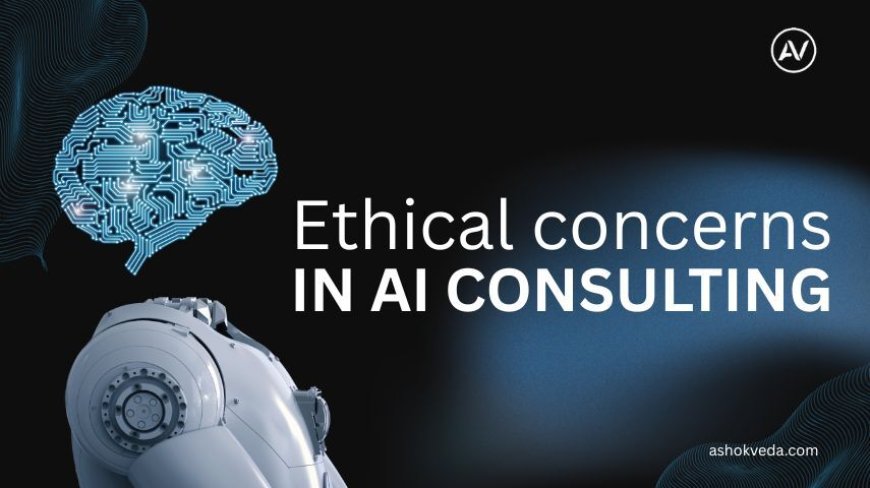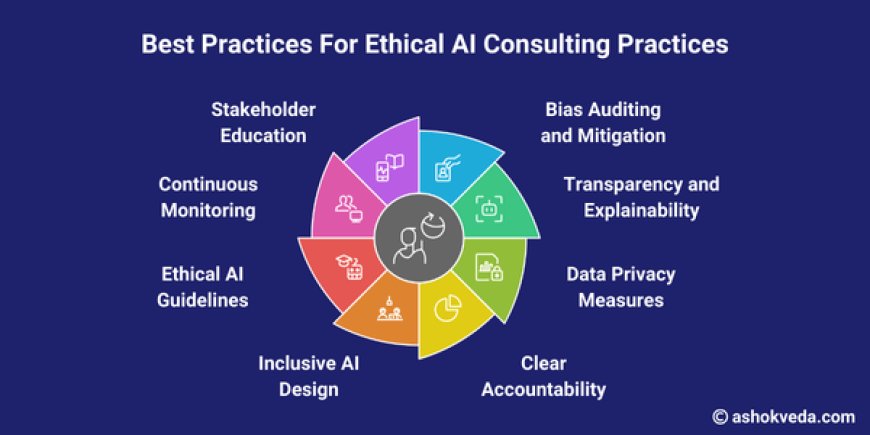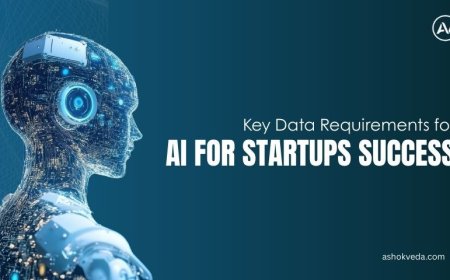Top Ethical Concerns in AI Consulting You Must Know
Explore the key ethical concerns in AI consulting, including bias, privacy, and transparency, and learn best practices for responsible AI adoption in 2025.

In the age of AI, consultants guide clients through complex technological landscapes—from deploying predictive models to automating critical decisions. According to a 2025 global survey, 72% of businesses consider ethical risks a top barrier to adopting AI in their operations. Another recent study revealed a sharp increase of 60% in high-profile AI-related data incidents last year alone, including unauthorized profiling and data misuse. These numbers tell us that the phrase “ethical concerns in AI Consulting” isn't just trendy jargon—it’s a pressing reality.
AI consultants occupy a powerful position: they design, implement, and explain AI systems that can affect healthcare, hiring, finance, criminal justice, and more. Mistakes—or worse, oversights—in ethics can lead not only to reputational damage but deep societal harm. As AI advisory roles scale, it’s more important than ever to understand and actively address the ethical minefields embedded in consulting engagements.
Understanding Ethical Concerns in AI Consulting
Ethical concerns in AI consulting revolve around the responsible development, deployment, and monitoring of AI systems. These issues are critical because AI often operates on sensitive data and makes decisions that can affect lives, finances, and opportunities. Key areas of ethical concern include:
-
Bias and Fairness: AI systems trained on biased data can perpetuate discrimination, particularly in hiring, lending, and healthcare.
-
Transparency and Explainability: Many AI models operate as “black boxes,” making it hard for stakeholders to understand how decisions are made.
-
Data Privacy: AI relies on vast amounts of personal and organizational data, raising concerns about consent, security, and misuse.
-
Accountability: Determining who is responsible for AI-driven decisions can be complex, especially in automated systems.
-
Impact on Employment: Automation may replace jobs, requiring careful consideration of workforce transformation.
-
Security Vulnerabilities: AI systems are vulnerable to adversarial attacks, which can manipulate decision-making processes.
Common Ethical Challenges in AI Consulting
1. Data Privacy and Informed Consent Challenges
AI projects often depend on large datasets—frequently sourced from clients, third parties, or public records. Without clear, informed consent mechanisms, sensitive personal or demographic data can be unintentionally exposed or misused. In 2024 alone, 35% of AI deployments saw at least one dataset lacking explicit consent for secondary usage, leading to legal disputes and public backlash.
Consultants must navigate:
-
Client data vs. third-party data: If data originates from an external vendor or includes aggregated user data, consent terms may not cover AI training or model deployment.
-
De-identification limits: Even anonymized datasets can be vulnerable to re-identification through auxiliary datasets—case in point: a healthcare dataset supposedly "safe" was reverse-engineered to expose patient identities via public voter records.
Recommended Actions:
-
Conduct a data provenance audit, ensuring you track where and how data was collected and whether consent includes AI usage.
-
Use differential privacy techniques where feasible to add statistical noise and protect individual privacy.
-
Clearly document consent scope—explicitly stating whether personal data can be used for training, benchmarking, or publishing.
2. Bias, Fairness, and Unequal Impact
AI models often absorb and amplify societal biases present in the training data. A striking 2024 audit of AI hiring tools found that in nearly 40% of cases, algorithms disadvantaged minority applicants—sometimes even more so than human recruiters.
Fairness problems stem from:
-
Skewed data representation: If certain groups are underrepresented, model performance can suffer disproportionately when applied in diverse contexts.
-
Proxy bias: Features like zip codes or spending patterns may inadvertently proxy for race, gender, or socioeconomic status—even if the data doesn’t explicitly include protected attributes.
Illustrative Example:
A retail scoring algorithm trained on purchase data ended up penalizing customers in historically underinvested neighborhoods because those areas had less transactional data—not because of any legitimate risk signal.
Recommended Actions:
-
Perform fairness audits across protected groups, measuring metrics like false positive/negative rates and demographic parity.
-
Apply bias mitigation techniques—for example, re-weighting, resampling of underrepresented groups, or adversarial debiasing.
3. Transparency and Explainability Issues
Many clients demand clear, understandable AI recommendations—especially when outcomes affect people’s lives. But black-box models like deep neural networks or large transformers can be inscrutable. In a 2024 sentiment survey, 68% of decision-makers said they would only trust a model if they understood “how it reached its conclusion.”
Explainability Challenges:
-
XAI tools (like LIME or SHAP) provide local explanations—but these can be unstable or misleading if the model's internal logic changes slightly.
-
Complex model behaviors may resist simple explanations entirely—for example, transformer attention maps don’t always correlate with human-meaningful reasoning.
Recommended Actions:
-
Prioritize interpretable models (e.g., decision trees, rule-based systems) where stakes are high—especially in healthcare or finance.
-
When sophisticated models are needed, augment them with post-hoc explanations, but back these with human review loops before deployment.
4. Accountability and Liability Gaps
When AI technologies fail, who steps in? The client? The consulting firm? The software vendor? Ambiguities in contractual liabilities can lead to finger-pointing and costly legal entanglements.
Ethical Hazards:
-
Consultants may hand over poorly documented models with no clear ownership or post-deployment support outlined—leaving clients adrift when issues surface.
-
Regulatory regimes (e.g., Europe’s AI Act) may hold deployers accountable regardless of who built the model—so clients could face fines even if consultants are at fault.
Recommended Actions:
-
Draft clear contracts specifying responsibilities for training, testing, deployment, and post-deployment oversight.
-
Include model cards and documentation that detail model limitations, performance contexts, and known biases.
5. AI Misuse and Dual-Use Risks
AI tools can be repurposed for harm. Video analysis tools built for optimizing workflows may be misused for unauthorized surveillance. Generation models may create deepfakes or facilitate misinformation campaigns. In 2025, a global report flagged that 20% of certain AI tools were repurposed in dual-use scenarios (e.g., facial recognition deployed by unregulated groups).
Ethical Mitigations:
-
Conduct a dual-use risk assessment—anticipating how capabilities might be abused.
-
Implement usage constraints: e.g., exclude instructions facilitating abusive or surveillance behavior.
-
Advocate for watermarking generative content to help detect synthetic media downstream.
6. Environmental and Resource Sustainability
AI models, especially large ones, consume massive energy. Training a big transformer can emit as much carbon as a hundred flights across the Atlantic. As consultants, endorsing or deploying models without considering environmental impact carries ethical weight.
Key Issues:
-
COPE (Cost of Prediction vs. Energy): Many clients ask for performance, rarely querying energy overhead.
-
Edge deployments vs. cloud compute: Edge models may be more efficient, but less performant.
Recommended Actions:
-
Run energy audits, comparing performance metrics to compute carbon costs.
-
Explore efficient modeling techniques like distillation, pruning, quantization, or smaller architectures like efficient transformers.
7. Global Standards, Regulation, and Professional Ethics
While some countries have AI governance frameworks (e.g., the EU’s AI Act), the landscape remains fragmented globally. A lack of uniform standards leaves AI consulting prone to “ethics shopping”—picking permissive jurisdictions to avoid rigorous compliance.
Challenges:
-
Clients operating across multiple regions may unwittingly violate rules (e.g., GDPR + EU AI Act + upcoming US regulations).
-
There’s no industry-wide ethical certification akin to, say, accounting’s CPA or medical boards.
Recommended Actions:
-
Stay current on regulatory developments across geographies.
-
Adopt existing trustworthy frameworks—e.g., IEEE’s Ethically Aligned Design, OECD AI Principles—as internal standards.
-
Join or form professional collectives advocating for ethics certifications in AI consulting.
Best Practices for Ethical AI Consulting
AI consulting firms can adopt several best practices to ensure ethical AI deployment:
-
Bias Auditing and Mitigation – Regularly test AI models for discriminatory patterns and adjust algorithms accordingly.
-
Transparency and Explainability – Use XAI frameworks to clarify how AI models reach conclusions.
-
Data Privacy Measures – Ensure data is collected, stored, and processed ethically and securely.
-
Clear Accountability – Define roles and responsibilities for AI decision-making within organizations.
-
Inclusive AI Design – Engage diverse teams to build more representative and fair AI systems.
-
Ethical AI Guidelines – Establish comprehensive guidelines for responsible AI deployment.
-
Continuous Monitoring – Implement feedback loops to identify and correct ethical issues in real-time.
-
Stakeholder Education – Train employees and clients on the ethical use of AI systems.

Ethical AI Consulting in Practice
Several organizations have successfully incorporated ethical practices in their AI consulting engagements:
-
Healthcare AI: Ethical frameworks ensure patient data privacy and prevent diagnostic biases.
-
Financial Services: AI lending models are audited to prevent discrimination and ensure transparency.
-
Government Applications: Public sector AI systems are designed with accountability measures to prevent misuse.
Consultants play a key role in guiding these organizations to balance innovation with responsibility.
The rise of AI brings immense opportunities but also significant ethical challenges. Addressing ethical concerns in AI consulting is no longer optional—it is a necessity. By focusing on fairness, transparency, accountability, privacy, and societal impact, AI consultants can guide organizations toward responsible AI adoption. As AI continues to shape industries worldwide, ethical AI consulting will remain central to building trust, mitigating risks, and ensuring that AI benefits all stakeholders.





































